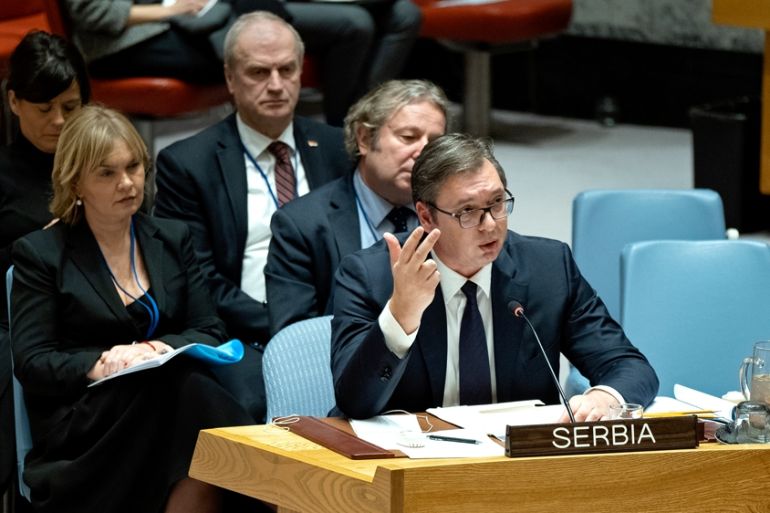Kosovo and Serbia trade accusations over Kosovo’s new army
At Security Council meeting Serbian president called on the UN to ‘tame’ Kosovo and take on a bigger role in dialogue.

The presidents of Kosovo and Serbia have faced off in the United Nations Security Council, days after Pristina’s parliament voted to transform their existing security force into a fully fledged army.
All parties in Kosovo’s 120-seat parliament, excluding the Serbs who boycotted, voted on Friday in favour of laws establishing a defence ministry, transforming the existing Kosovo Security Force (KSF) of 3,000 into an army and regulating the service.
Kosovo’s President Hashim Thaci said on Monday there was “nothing extraordinary” about the decision and that it was a “natural step” to establish an army to cement Kosovo’s status as a sovereign nation.
“If Kosovo made a mistake, it’s only that we waited for five years to establish an army,” Thaci said.
“Kosovo soldiers will be soldiers of peace and Kosovo’s army will be a contributor of stability to the region,” he added.
Thaci said the degree of UN involvement should be reviewed, as the attention of the international body is needed elsewhere “to address real problems facing the world today”.
|
|
Serbian President Aleksandar Vucic, however, called on the UN to “curb” and “tame” Kosovo, and take on a bigger role in the dialogue between the two groups in future. He also dismissed the “so-called sovereign right” of Kosovo to form their own military.
Serbia continues to claim predominantly Albanian Kosovo as its own, despite the region having declared independence nearly 11 years ago.
Vucic said he was “very much worried, very much concerned and even a bit afraid” about the implications of a Kosovan army for the region.
Ethnic Albanians rebelled against Belgrade’s rule in 1998-99 in a war that eventually drew NATO to intervene against Serbia. A NATO-led peacekeeping force has been in Kosovo ever since.
![Kosovo President Hashim Thaci addressed the UN Security Council on Monday [Craig Ruttle/AP]](/wp-content/uploads/2018/12/c5880a5768804a7cb695b10f4f37a845_18.jpeg)
Recognising KSF’s transition
UN Secretary-General Antonio Guterres has expressed concern over the plans to strengthen the Kosovo Security Force, noting in a statement that any restriction to the security responsibilities of the NATO-led KFOR peacekeeping mission would be inconsistent with the UN Security Council resolution that regulates KFOR.
Russia’s UN ambassador Vassily Nebenzia said expanding the army was a “blatant violation” of Security Council resolutions and called the creation of the army “illegal”.
Russia is traditionally the protecting power of Serbia, from which the primarily Albanian-populated Kosovo broke off in 2008.
The current and incoming European Union members of the UN Security Council recognised the transition of the KSF as Kosovo’s sovereign right, in a joint statement. Britain, France, Germany, Belgium and Sweden were among the countries calling on Kosovo to make the transformation of their armed forces “transparent and inclusive” and in close cooperation with NATO.
They also called on both Pristina and Belgrade to lower tensions and resume dialogue, noting that a comprehensive normalisation agreement to set out the conditions of the future relationship between the two sides still needs to be reached.
Recent tensions between Kosovo and Serbia have frustrated an EU-brokered normalisation process.
Last month, Serbia blocked Kosovo from joining the Interpol law enforcement agency and Pristina responded by imposing trade tariffs on Serbian goods, drawing scorn from the EU.
Prime minister of Kosovo, Ramush Haradinaj, said that the tariffs were in retaliation to Serbia’s “destructive policies” and promised further measures.
NATO has also voiced concerns over Pristina’s plan for an army.